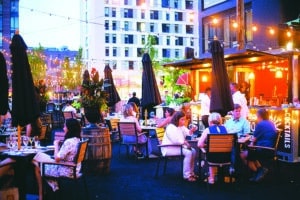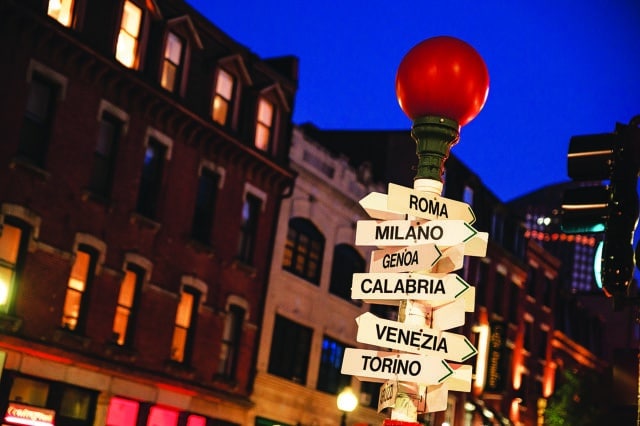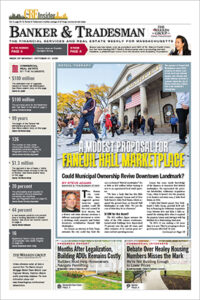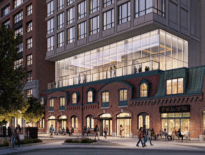
Outdoor dining has become a staple of the Seaport District landscape, while North End restaurant owners pursue a lawsuit challenging fees and limits on the use of public property in their neighborhood. Photo courtesy of WS Development
Rather than the perennial question of who has the best cannoli, the North End’s biggest dining debate these days is over the state of outdoor dining.
But if you leave the densely settled enclave, it’s a significantly more upbeat rollout of outdoor dining across the region.
Cities including Cambridge are relaxing outdoor dining regulations to reduce costs and permitting timelines for patio approvals.
“One of the complaints about Boston was there were not enough waterfront restaurants or enough outdoor dining and rooftop dining. This makes Boston much more like Europe,” said Todd Corbett Smith, founder and managing partner of restaurant brokerage Corbett Restaurant Group. “I think it’s a no-brainer, as any kind of parking revenue or anything like that can be offset by fees from the restaurant owners.”
But while outdoor dining might be charming, it hasn’t always been a charming rollout. In fact, it’s turned into a legal battle in terms of how it has played out in the North End.
The North End Chamber of Commerce and more than 20 restaurants in the neighborhood filed an amended complaint in U.S. District Court against the city of Boston for its restrictions on outdoor dining in the neighborhood. The lawsuit also charges the city singled out the neighborhood with hefty fees to participate in outdoor dining, and has significantly overestimated the city’s costs related to outdoor dining.
The city maintains the restrictions prohibiting on-street outdoor dining stems from the neighborhood’s narrow streets, limited residential parking and high foot traffic.
“It is evident that the city’s policies are rationally related to the city’s desire to maintain the North End neighborhood’s quality of life because they were designed to mitigate the impacts of outdoor dining on congestion, cleanliness, accessibility, and public safety on this uniquely small, dense, and congested neighborhood,” Boston’s legal counsel team wrote in a motion to dismiss filed last month.

A fight between residents and restaurant owners in Boston’s North End over mitigating the negative aspects of outdoor dining has stymied the return of outdoor dining in the neighborhood for another year. iStock photo
Range of Fees Apply to Public Properties
But the legal skirmish doesn’t appear to be putting a damper on outdoor programs beyond the North End.
“In Medford, we’re really excited about outdoor dining, and the mayor is supportive of it because she hears from residents and visitors alike, who enjoy not only dining out themselves but also seeing the atmosphere that outdoor dining creates,” said Salvatore Di Stefano, Medford’s economic development director.
Medford is accepting applications for its outdoor dining program, which runs through Halloween. The city takes a variety of factors into consideration, including availability of space, accommodation of neighboring businesses, accessibility and health and safety. Currently the program has nine applicants, which is the same as last year, Di Stefano said.
Municipalities often charge a fee for restaurants to use patios on public property such as sidewalks. Boston charges $199 per month for restaurants not serving alcohol outside and $399 per month for those that do.
Cambridge charges a $750 annual fee for outdoor dining at restaurants serving alcohol. There is a $75 annual fee for the right to use a sidewalk or street for outdoor dining no matter if the restaurant serves alcohol or not. Cambridge restaurants that do extend their outdoor dining into a parking or travel lane will also incur a $250 annual fee per parking space used.
Unlike other municipalities, Medford doesn’t charge restaurants a fee to take part in outdoor dining. Rather than see it as a revenue generator for the city, economic development officials instead see outdoor dining as a way to bring more people to the city.
“As far as economic development, we view outdoor dining as a positive benefit for the city, and we feel like restaurants being able to expand their seating is a positive thing,” DiStefano said, mentioning the influx of visitors for performances at the Chevalier Theatre as an opportunity.
Suburbs See Economic Development Tool
Outdoor dining is also a significant revenue generator. Corbett Smith pointed to South Boston as a neighborhood where some restaurants have managed to double their revenue by incorporating outdoor dining into their business model.
“This is a pathway forward for a profit center for restaurants,” he said.
There appears to be further opportunity for outdoor dining across Greater Boston, even into colder months.
According to a recent press release, the Cambridge Board of License Commissioners voted May 8 to update its regulations to reflect recent changes in state law that regulate outdoor dining.
Cambridge will no longer require notification of abutters or publication of outdoor dining applications in a local newspaper.
“The new process is expected to speed up the timing by which the applications will be before the Board by at least two weeks, alleviate businesses’ pre-operational and application costs, and reduce the turnaround time by at least four weeks,” the announcement states.
Cambridge officials did not respond to Banker & Tradesman’s request for comment, but others noted the desire to support the restaurant industry.
“I can say we’re always open to ideas, but we realize that anything that a restaurant wants to do, it has to be staffed appropriately, and their needs come first,” Di Stefano said. “If there are ideas that restaurants have that they want to do, even if it’s a one-time or a pop-up type event, we’re happy to listen.”






